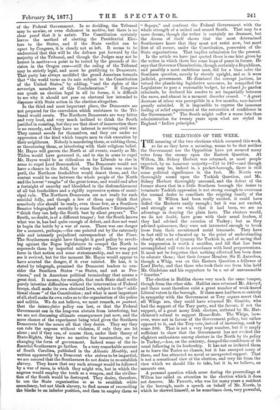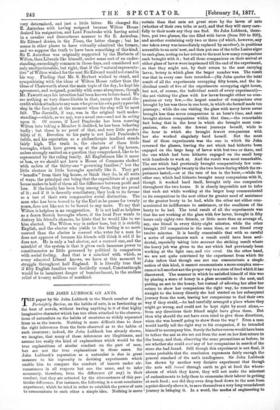THE ELECTIONS OF THE WEEK.
THE meaning of the two elections which occurred this week, so far as they have a meaning, seems to be that neither the Government nor the Opposition have yet secured many votes from the enemy upon the Eastern Question. At Wilton, Mr. Sidney Herbert was returned, as most people expected, by an immense majority-751 to 187—and though Wilton may be, indeed is, a pocket-borough, there is still some political significance in the fact. Mr. Norris was thoroughly sound upon the Turkish Question, and Mr. Sidney Herbert thoroughly unsound, and the defeat of the former shows that in a little Southern borough the desire to terminate Turkish oppression is not strong enough to overcome the normal desire to conciliate the reigning family of the place. If Wilton had been really excited, it could have defied the Herberts easily enough ; but it was not excited, and strongly as we wish that it had been, we see no advantage in denying the plain facts. The electors would, we do not doubt, have gone with their usual leaders, if they had advised the coercion of Turkey; but as they advised quiescence, they were not interested enough to break loose from their accustomed social trammels. They have in fact still to be educated up to the point of understanding clearly what sort of tyranny the Turkish is, and of seeing that its suppression is worth a sacrifice, and till that has been accomplished will vote in accordance with local prepossessions. It must not be forgotten that nothing effectual has been done to educate them ; that their former Member, Sir E. Antrobus, though a Whig, was on this Eastern Question a follower of Lord Derby, and that those who took their cue from him held Mr. Gladstone and his supporters to be a set of unreasonable " fanatics."
The election in Halifax shows very much the same temper, though from the other side. Halifax once returned Mr. A kroyd, and there must therefore exist a great number of weak-kneed Liberal voters in the borough. If these men had been so entirely in sympathy with the Government as Tory organs assert that all Whigs are, they could have returned Mr. Gamble, who had the support of the Tory party, and the favour, if not the support, of a great many Irish electors, irritated by Mr. Hut- chinson's refusal to support Home-Rule. The Whigs, how-
ever, were not in favour of the Government policy, but rather opposed to it, and the Tory vote, instead of increasing, sank by
some 300. That is not a very large number, but it is amply sufficient to show that the Government has not evoked the slightest enthusiasm among electors in the North by its policy in Turkey,—has, on the contrary, damped the confidence of its usual following in its leadership. It has not so irritated them as to leave the Tories no chance, but it has annoyed many of them, and has attracted no novel or unexpected support. That is not a sensational view of the election, and very far from the view which we should like to take, but it is, we believe, an accurate one.
A personal question which arose during the proceedings at Wilton has called an attention to the election which it does not deserve. Mr. Fawcett, who was for many years a resident in the borough, made a speech on behalf of Mr. Norris, in which he showed himself, as he sometimes does, very powerful,
very determined, and just a little bitter. He charged Sir E. Antrobus with having resigned because Wilton House desired his resignation and Lord Pembroke with having acted in a cavalier and discourteous manner to Sir E. Antrobus. Sir Edward denies in the Times, the latter charge ; but he seems in other places to have virtually admitted the former, and we suppose the truth to have been something of this kind. Sir E. Antrobus was originally supported by the Herberts of then Liberals like himself, under some sort of an under- standing, exceedingly common in those days, and considered not only unobjectionable, but right, that if the " natural representa- tive of Wilton wished for the seat Sir Edward would not stand in his way. Finding that Mr. S. Herbert wished to stand, and sympathising with the ideas of Wilton House rather than the ideas of Chatsworth about the main topic of the day, he kept his agreement, and resigned, possibly with some abruptness, though Mr. Fawcett says his intention had been known before-hand. We see nothing so very discreditable in that, except the usual dis- credit which attaches to any man who gives his own party a peevish slap in the face just at the moment when the slap will be most felt. The discredit, if any, was in the original tacit under- standing—which, as we say, was a usual one—and not in acting upon it. Of course, if Lord Pembroke has been coercing Wilton into taking a Member it disliked, he has been behaving badly ; but there is no proof of that, and very little proba- bility of it. Devotion to his party is not Lord Pembroke's foible, and his reputation as a philanthropic landlord stands fairly high. The truth is, the electors of these little boroughs, which have grown up at the gates of big houses, unless strongly excited on a question they comprehend, like to be represented by the ruling family. All Englishmen like it more or less, or we should not have a House of Commons choked with cadets of the thirty-one "governing families ;" but the little electors in little boroughs specially like it. They get " benefits " from their big house, or think they do, in all sorts of ways the principal one being that the expenditure of a great house Makes to half of them all the difference between profit and loss. If the family has been long among them, they are proud of it ; and if it is decently conciliatory, they look to its favour as a test of their own comparative social distinction. The man who has been bowed to by the Earl as he passes for twenty years, does not like not to be bowed to any more. To say that Wilton is helpless is an exaggeration. It is not half as helpless as a dozen Scotch boroughs where, if the local Peer wants to destroy his friend's chances, he hints that he would like to see him elected. The Wilton way is rather base, but it is strictly, English, and the elector who yields to the feeling is no more coerced than the elector is coerced who votes for a man he does not approve of because his friends will think it odd if he does not. He is only a bad elector, not a coerced one, and the mischief of the system is that it gives such immense power to constituencies so little governed by political in comparison with social feeling. And that is a mischief with which, as every educated Liberal knows, we have at this moment to struggle throughout half England. It is literally true that if fifty English families went decidedly round, Constantinople, would be in imminent danger of bombardment, to the endless relief of twenty millions of mankind.



































 Previous page
Previous page